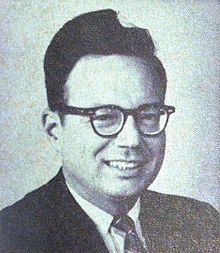Theodore R. Kupferman
| Theodore R. Kupferman | |
|---|---|

Theodore R. Kupferman from the Pocket Congressional Directory of the Ninetieth Congress, published in 1967.
|
|
| New York City Council | |
|
In office 1962–1966 |
|
| Preceded by | Stanley M. Isaacs |
| Succeeded by | Woodward Kingman |
| Member of the U.S. House of Representatives from New York's 17th district |
|
|
In office February 8, 1966 – January 3, 1969 |
|
| Preceded by | John Lindsay |
| Succeeded by | Ed Koch |
| Personal details | |
| Born |
Theodore Roosevelt Kupferman May 12, 1920 New York City, U.S. |
| Died | September 23, 2003 (aged 83) New York City |
| Resting place | Kensico Cemetery, Valhalla, New York |
| Political party | Republican |
| Spouse(s) | Frederike Hering (m. Dec. 21, 1957) |
| Education | DeWitt Clinton High School (1937) |
| Alma mater |
City College of New York (1940) Columbia Law School (1943) |
| Profession | |
Theodore Roosevelt Kupferman (May 12, 1920 – September 23, 2003) was a Republican member of the United States House of Representatives from New York and a judge of the New York Supreme Court.
Kupferman was born in New York City. He graduated from DeWitt Clinton High School (1937), City College of New York (1940), and Columbia Law School (1943).
He was a member of the legal department of Warner Bros. Pictures from 1943 until 1948 and from 1949 until 1951. He was a member of NBC's legal department from 1951 until 1953. He served as president of the City Club of New York from 1956–1958. He was a counsel and legislative assistant to Stanley M. Isaacs, the New York City Council minority leader, from 1958 to 1962, during which time he wrote The Family Legal Advisor (Greystone, 1957); it was later republished by Ace Books. Kupferman was an assistant and adjunct professor of law at New York Law School from 1959 until 1964.
He was a member of the New York City Council from 1962 until 1966. Kupferman was elected to Congress in 1966, defeating William vanden Heuvel to fill the vacancy caused when John V. Lindsay resigned to become Mayor of New York City. He was elected to a full term in November 1966 and served from February 8, 1966 to January 3, 1969. In the fall of 1966 Kupferman proposed a special committee to review the Warren Commission's work and conclusions, but the proposal was not acted on.
...
Wikipedia
